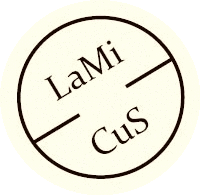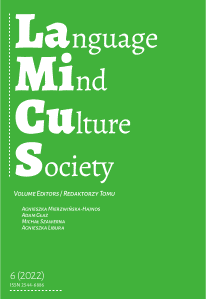LaMiCuS 6 (2022)
Table of contents / Spis treści
Od Redakcji 8-10
Iwona Kokorniak, In memoriam / Wspomnienie
Articles / Artykuły
Hubert Kowalewski, Vitality as a parameter of vehicle selection in causal metonymies, 18-39
Salience governing the selection of vehicle concepts in metonymies is a complex and multifaceted phenomenon. While no single criterion does justice to this complexity, one factor that significantly contributes to salience is the strength of a contiguity relation. In the case of causal metonymies, the strength of relation can be conveniently evaluated in terms of non-redundancy and non-fungibility prompted by John Mackie’s inus framework. The framework stipulates that what we typically consider as a cause of a state of affairs is an insufficient non-redundant part of an unnecessary suf ficient scenario leading up the state of affairs. The article adapts and refines the model to propose a useful heuristic for evaluating the strength of causal connections. This,
in turn, sheds light on the process of vehicle selection in metonymies, since the stronger causal connection between a concept and the target, the greater the probability that the concept will be selected as a vehicle of a metonymy. Expressions used in the case studies are derived from phonic English and American Sign Language.
Keywords: conceptual metonymies, causal metonymies, vehicle selection in metonymies, ASL
Rafał Pedrycz,
The contribution of linguistic landscape to the construction of a dystopian world in the video game Cyberpunk 2077, 40-66
The aim of this article is to show the contribution of linguistic landscape to the construction of a dystopian world in the video game Cyberpunk 2077. Virtual linguistic landscape remains a largely unexplored field as it has only recently raised the interest of researchers. Previous studies introduced the notion of virtual linguistic landscape and discussed cyberspace in general. This study aims to show that video games can also involve complex environments worth further in-depth research within the virtual linguistic landscape framework. The data used in the study has been obtained directly from the video game in the span of four days. The whole environment available to the player was documented in order to allow for a comprehensive study of the linguistic landscape. The data was analysed on the basis of four analytical categories that reflect the characteristics of dystopia. The first analytical category is the society of the future, in which people are living with advanced technology and the spread of globalisation. The second category is moral decay, tackling societal decadence and emotional callousness. The third category is oppression of citizens, focusing on the distribution of inf luence on signs between the three warring sides: the government, corporations, and citizens through their language of dissent. The last analytical category is dehumanisation, engaging in the topic of overuse of cybernetic implants and the subsequent deprivation of individuality. The results shows that the linguistic landscape of Cyberpunk 2077 does in fact indicate the dystopian nature of the gameworld, set within the context of the cyberpunk genre.
Keywords: cyberpunk, video games, dystopia, linguistic landscape, city, linguistics, gameworld, aesthetics, Cyberpunk 2077
Małgorzata Fabiszak, Nikolaus Ritt, Elisabeth Wacker, A Historical Dynamic Approach to Metaphor, 68-95
Keywords: conceptual metaphor, historical dynamic approach, complex systems, evolutionary linguistics
Katarzyna Dziwirek, Metatextual expressions as signals of intentions in Polish and English, 96-114
Metatextual expressions provide a commentary on the way that the content of the message is conveyed. The paper focuses on the meaning of four expressions in Polish and English: powiem tak/I will say this, że tak powiem/so to speak, powiedzmy/let’s say, and jak to się mówi/as they say and the
speaker intensions they communicate. By and large, these phrases are exculpatory, and serve to preempt objections to what follows. They may serve to warn the listener that the speaker is using a metaphorical expression (że tak powiem/so to speak), a possibly incorrect or trite word or phrase, (jak to się mówi/as they say), or a possible untruth (powiedzmy/let’s say). When it comes to powiem tak and I will say this, however, they signal that a contrast is about to follow or to be avoided. The core meanings of the Polish and English expressions are quite similar and the differences in their use follow from different cultural scripts underlying discourse in the two cultures. The data cited in the paper come from COCA (Corpus of Contemporary American English) and NKJP (Narodowy Korpus Języka Polskiego).
Keywords:
discourse, Polish, English, metatextual expressions, speaker intentions, corpus studies, Natural Semantic Metaanguage
Kamila Turewicz, Przygody Pędrka Wyrzutka – metafora drogi życia i poznania, 116-138
Artykuł proponuje interpretację powiastki Stefana Themersona Przygody Pędrka Wyrzutka za pomocą metafory pojęciowej życie jest podróżą oraz jej uszczegółowionej wersji rozwój poznawczy człowieka jest podróżą. Podjęto próbę ustalenia, w jakim zakresie kognitywne podejście do języka pozwala wnioskować, iż Themerson budował swój przekaz na temat poszukiwania tożsamości człowieka za pomocą przenośni językowych, które rozumiemy i interpretujemy dzięki znajomości systematycznych metafor pojęciowych. W artykule bada się także możliwości wyjaśnienia związków między konstrukcjami scen w poszczególnych rozdziałach książki oraz postaci w nich występujących (wchodzących w interakcję z głównym bohaterem), a etapami rozwoju człowieka, nabywania wiedzy o życiu i o samym sobie. Nasze (roz)poznanie rzeczywistości strukturyzują zatem schematy wyobrażeniowe oraz, na bardziej szczegółowym poziomie konceptualizacji, metafory pojęciowe, dzięki którym nie tylko wyrażamy, ale także kształtujemy interakcje z drugim człowiekiem.
Słowa kluczowe:
Przygody Pędrka Wyrzutka, metafora pojęciowa, schematy wyobrażeniowe, interpretacja tekstu, życie jest podróżą, rozwój poznawczy człowieka jest podróżą
Review / Recenzja
Agnieszka Gicala 2021: Translating a Worldview: Linguistic Worldview in Literary Translation. Berlin: Peter Lang. ISBN 978-3-631-86136-3 (Print); E-ISBN 978-3-631-86137-0 (E-Book); E-ISBN 978-3-631-86156-1 (EPUB). DOI: 10.3726/18650, 140-145
Reviewed by Adam Głaz
Debate / Debata
Language and thought, 146-161
Participants: Reinhard Blutner (University of Amsterdam, The Netherlands), Mitchell Green (University of Connecticut, USA), Zoltán
Kövecses (Eötvös Loránd University, Budapest, Hungary), Günter Radden (University of Hamburg, Germany), and Alexander Ziem (University of Düsseldorf, Germany)
Interview / Wywiad
Krystyna Waszakowa, Czy łatwo strukturalistce odnaleźć się w kognitywizmie?, 162-173

